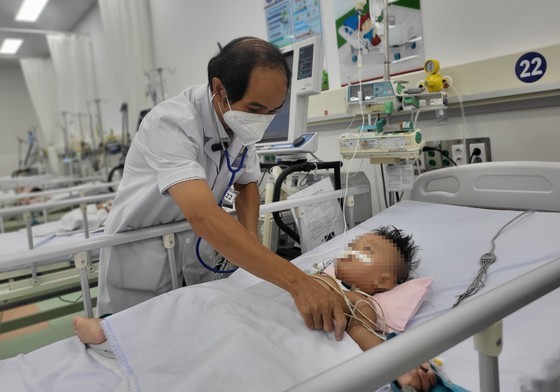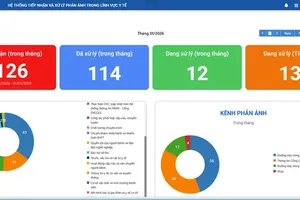 |
A doctor examines a child with severe hand, foot and mouth disease |
Due to the soaring number of cases of hand, foot and mouth disease, many children's hospitals in Ho Chi Minh City have had to expand more rooms and medical staff have had to work around the clock.
The Ho Chi Minh City-based Children's Hospital 1 reported the number of HFMD cases increased from 50 last week to 200 this week. Doctor Du Tuan Quy, Head of the Department of Neurological Infections, said that almost every day, children have been transferred to the intensive care unit. Hand, foot and mouth disease is approaching the peak of the epidemic, the hospital is constantly overloaded; therefore, 2-3 inpatients have to share a bed. Hospital medical staff have to work continuously overtime day and night, running off their feet and working relentlessly.
Particularly, the Department of Intensive Care and Anti-Poisoning, Children's Hospital 1, currently has 12 children with hand, foot and mouth disease who need to be resuscitated, including many children who are being put on mechanical ventilation and dialysis. According to Assoc. Prof. Dr. Pham Van Quang, Head of the Intensive Care Unit and Anti-Poisoning Department, the Department is treating a 6-month-old child living in Binh Chanh District with severe hand, foot and mouth disease requiring dialysis and intubation. Worse, doctors had to inject his bone marrow for infusing drugs.
Currently, the Children's Hospital 1 receives 400 children a day; thus its eight examination rooms for outpatients with hand, foot and mouth disease have been operated at full capacity. Children are regularly re-examined to promptly detect signs of serious change. The Intensive Care Unit is also ready to reserve 20 of the 30 beds for children with severe and very severe hand, foot and mouth disease.
Dr. Le Thi Kim Ngoc, Deputy Head of the Hospital for Tropical Diseases in Ho Chi Minh City’s Pediatrics C, said that in previous years, severe hand, foot and mouth patients usually only reached the grade 2a, but now, more patients have been diagnosed with the grade 2a to 2b or to grade 3. Pediatrics Department C has 50 beds, but 40 cases have been infected in the grade 2a.
The Vietnam Ministry of Health established the following grading for HFMD at admission.
Grade 1 is an uncomplicated disease with fever and vesicles or papules on hands, feet, buttocks, and oral mucosa.
Grade 2a is the presence of myoclonus as reported by the caregiver.
Grade 2b is when myoclonus is observed by a physician.
Grade 3 is the presence of autonomic dysfunction with a fever that is unresponsive to antipyretics, hypertension and persistent tachycardia.
Grade 4 exhibits cardiopulmonary compromise with pulmonary edema or hemorrhage.
Grades 2b, 3, and 4 describe severe disease and are indicators for hospital admission and treatment.
According to the Center for Disease Control of Ho Chi Minh City, in the past week, the city recorded 1,614 cases of hand, foot and mouth disease, an increase of nearly 2.5 times compared to the average of 4 weeks ago. The districts with a high number of hand, foot and mouth infections per 100,000 people include Binh Tan, Tan Phu, 6, 8 and Binh Chanh districts.
Dr. Du Tuan Quy from the Children's Hospital 1, has experienced large outbreaks of hand, foot and mouth disease: in 2011, 2018 and this year. With the experience of fighting many dangerous epidemics, the hospital has had plans for fighting the disease at different levels. Healthcare staff have been mobilized for increased treatment demand.
Assoc. Prof. Tang Chi Thuong, Director of the Department of Health of Ho Chi Minh City, said that the city's health sector has developed a response scenario consisting of three levels.
The Department of Health has assigned the Children's Hospital 1, the Children's Hospital 2, the Children's City Hospital and the Hospital for Tropical Diseases to continue providing professional support to their peers in grassroots clinics in southern provinces and cities in a bid to promptly minimize mortality.
He advised parents to take their child to the nearest medical facility to determine the disease and closely monitor the development of the disease when suspecting that a child has hand, foot and mouth disease. Moreover, parents should not be too worried to rush to Ho Chi Minh City-based infirmaries to cause overload. Provincial hospitals currently treat this disease well with medicines and qualified personnel.
Long An Province in the Mekong Delta region has seen a skyrocketing number of cases of hand, foot and mouth disease. Director of Long An Provincial Department of Health Huynh Minh Phuc said that in June, the Mekong Delta province detected and handled 9 outbreaks of hand, foot and mouth disease with 353 cases, an increase of 7 times compared to the previous month with 50 cases.
Elsewhere in Tien Giang Province, since the beginning of the year, more than 500 cases of hand, foot and mouth disease have been recorded, down 25.8 percent over the same period in 2022 meanwhile Dong Thap Province reported 1,327 cases of hand, foot and mouth disease, down 20 percent compared to the same period in 2022.
























